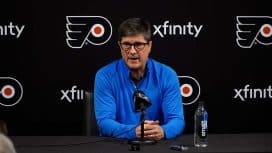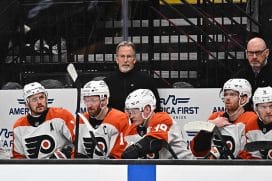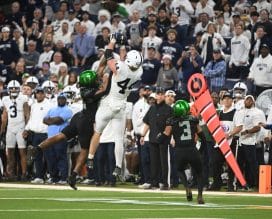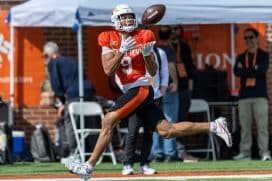Eagles
Eagles hope third time is the charm, vie for first Super Bowl win
By: Jesse Larch, Sports Talk Philly editor
Stop me if you've heard this one before.
A team goes 7-9, then comes back the next season and loses three team captains to season ending knee injuries, one of which was the top candidate for most valuable player, and another is a nine-time Pro Bowler bound for a spot in Canton.
The team also loses their starting middle linebacker who led his position in interceptions a season ago, then they lose that linebacker's backup, and a running back who is one of the NFL's all-time leaders in all-purpose yards.
That team then rallies around a coach who was ranked as the worst in the league in 2016 and deemed the least qualified in the NFL by a certain ex-executive, and a backup quarterback who was inches from retiring before getting a phone call from a previously exiled general manager.
That team goes on to defeat the conference's defending champions, and then the best defense in football to play in a Super Bowl that everyone gave them no chance to reach.
Have you heard that one already? Me neither, but that is exactly what the Philadelphia Eagles have done in 2017 – defied the odds at every turn and now they will look to do it one more time in Super Bowl LII to bring the City of Brotherly Love its first Super Bowl after a half-century of waiting.
Eagles Super Bowl History
The Eagles have played in two Super Bowls in their franchise's history.
The first Super Bowl was the 1980 team led by Dick Vermeil and Ron Jaworski. In Super Bowl XV the Eagles surrendered 14 points in the first quarter to the Jim Plunkett-led Oakland Raiders.
The Eagles' offense failed to show up against Oakland, with the Raiders' defense collecting three interceptions and a fumble recovery. Ron Jaworski was guilty of all four turnovers and Rod Martin is responsible for the three Jaworski interceptions.
The Raiders won 27-10 and Jim Plunkett won the MVP of Super Bowl XV with 261 yards passing and three touchdowns.
The Eagles' second Super Bowl appearance came in Super Bowl XXXIX against the same New England Patriots that they will face in Super Bowl LII.
The Eagles jumped out to a 7-0 lead after Donovan McNabb found L.J. Smith for a six yard touchdown.
The Patriots answered with a touchdown of their own when Tom Brady found David Givens from four yards out.
The Patriots took their first lead of the game after linebacker Mike Vrabel lined up with the offense in a goal line formation and caught a two yard pass to score a touchdown.
The Eagles tied late in the third quarter when Brian Westbrook scored on a pass from Donovan McNabb.
The Patriots took hold of the game in the fourth quarter with 10 unanswered points to jump out to a 24-14 lead.
McNabb would connect with Greg Lewis for a 30-yard touchdown to pull the Eagles within three, but could not make up the difference in time to earn the victory.
Deion Branch took home the MVP of Super Bowl XXXIX with a dominant 11 reception, 133-yard performance.
The Eagles will hope that the third time is the charm, and that they can finally walk away with a Super Bowl Victory tonight.
Backup Quarterbacks in the Super Bowl
Jim Plunkett beat the Eagles in Super Bowl XV, and he did so as a backup for the Raiders when starting quarterback Dan Pastorini suffered a leg fracture.
Nick Foles is in a similar situation now, with Foles taking over for Carson Wentz in week 14, and now getting the opportunity to play.
In the 52-year history of the Super Bowl. Foles is the 11th backup quarterback to play in the big game.
In the previous ten instances, the backups are an astounding 9-1, with five of those quarterbacks going on to win the Super Bowl MVP. Roger Staubach (VI), The aforementioned Plunkett (XV), Doug Williams (XXII), Kurt Warner (XXXIV), and Tom Brady (XXXVI) all earned MVP honors for their performances.
Other backups to take the reigns and win the big game are Earl Morrall (V), Terry Bradshaw (IX), Jeff Hostetler (XXV), and Trent Dilfer (XXXV). The only backup to lose in the Super Bowl is Vince Ferragamo (XIV), who lost to Bradshaw five years after Bradshaw won as a backup.
If history is any indicator, Foles is destined for a big night.
A Tale of Two Defenses
The Eagles defense has been on a tear of late, not allowing a single point in the second half of either of their previous two playoff games.
It does not come as much surprise for a defense that has been dominant all season long. The Eagles ranked first in the NFL in rushing defense, allowing a suffocating 79.2 yards per game on the ground. The Eagles also ranked fourth in the NFL in total defense, allowing 306.5 yards per game.
The Patriots' defense was porous in 2017, with the 30th ranked pass defense and 20th ranked rushing defense, allowing a fourth-worst 366 yards per game.
The Eagles finished tied for fourth in the NFL with 19 interceptions while the Patriots were tied for 18th with 12. The Eagles tied for 14th with 14 forced fumbles while the patriots were tied for 27th with nine. That Patriots recovered five of their forced fumbles and the Eagles recovered 11.
It is an extremely lopsided matchup, but where the two teams are virtually equal is in points allowed per game. The Eagles were fourth in the NFL with 18.4 points allowed per game while the Patriots were one spot behind them allowing 18.5 points per game.
The Eagles run defense has been even better in the playoffs allowing just 78 yards a game. The Patriots have limited opponents to 83 yards however.
The Eagles have improved on their pass defense in the playoffs to allow just 229 yards per game in the air. The Patriots are again not far behind them allowing 237.5 yards in the air.
While the yardage totals have been closer during the playoffs, The Eagles have erased the close proximity in scoring that the Patriots had in the regular season. In the playoffs the Eagles are allowing an average of 8.5 points per game while the Patriots have allowed 17 points per game – twice as many.
Adjusting to the Stage
The Super Bowl brings with it a number of distractions that can affect a team negatively.
The expansive media coverage which far exceeds the usual scope of an NFL game forces the players to take time out of their normal routines to meet with members of the press and engage in promotions for the NFL.
Aside from the media obligations, the players also get to enjoy their new surroundings and explore all that the host city has to offer.
Inside the game there is the added obstacle of an extended halftime. With the Pepsi Halftime Show taking up a 30 minute chunk of time, the players are forced to wait, and any momentum that may have been generated dies.
The Eagles attempted to prepare for this by halting practice for 30 minutes to simulate halftime. Doug Pederson recalled his team playing sloppy football after the break, but hopes that it will serve as a valuable teaching moment ahead of the biggest game of the season.
"I’ve been around these guys all year and I can tell by the way they practice," said Pederson. "That doesn’t tell you how they’re going to play. But it just tells you that they’re prepared." Pederson is confident that his team will be ready despite all of the distractions in Minneapolis.
Injury Report
No player from either team carries an injury designation into Super Bowl LII.
Broadcast Information
Time: 6:30 p.m.
Television: NBC | Play-by-Play by Al Michaels with color commentary by Chris Collinsworth and sideline reports from Michelle Tafoya
Radio: 94.1 FM WIP | Play-by-Play by Merrill Reese with color commentary by Mike Quick and sideline reports from Howard Eskin
Online: NFL Game Pass





